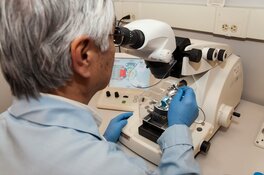Clinical stage biotechnology company Sernova Corp. (SVA:TSX.V; SEOVF:OTCMKTS; XETRA:PSH), which is developing therapeutic cell technologies for chronic diseases with its Cell Pouch™ Transplant System, has presented new updated interim positive data from its ongoing Phase I/Phase II clinical trials involving patients with insulin-dependent (Type 1) diabetes.
The data evaluating the safety, tolerability, and efficacy of the system were presented by the lead investigator for the study, Dr. Piotr Witkowski, professor of surgery and director of the Pancreatic and Islet Transplant Program at University of Chicago Medicine.
The Cell Pouch™ acts as a pseudo-organ to deliver therapeutic cells to the body as a "functional cure" for the disease. The new data show after being in the body for more than five years in a patient who reached sustained insulin independence (no longer having to take insulin daily), the pouch demonstrated "long-term survival of abundant insulin, glucagon, and somatostatin producing islet cells," the company said in a release.
According to the data from the study, islet cells survived across all chambers of the implanted Cell Pouch™ with robust vascularization and with no evidence of detrimental fibrotic tissue, material degradation, or change in the architecture of the pouch.
"Islet transplantation could significantly improve the quality of life for people with T1D," said Witkowski, who presented the data during an oral session at the 2024 European Association for the Study of Diabetes annual meeting in Madrid. "This is a major step forward in the development of a contained and retrievable cell therapy for the treatment of T1D. This is the first evidence that I am aware of that demonstrates this level of healthy islet survival and function in an implantable and retrievable system for such a long duration."
24 Hours a Day
Sernova's chief executive officer, Jonathan Rigby, who is a Type 1 diabetic himself, said the results were "extremely exciting" for him and the millions of others who suffer from the disease.
"It's a disease that haunts you 24 hours a day, it scares you 24 hours a day," Rigby told Streetwise Reports. "It frightens my wife, and it frightens the life out of my kids. They worry that I'm not going to wake up in the morning. It's that close to me."
Chris Temple, author of The National Investor newsletter, believes the stock is extremely undervalued and could deliver major upside to investors as its technology develops.
He noted that to generate data shows the company's Cell Pouch™ technology effectively can replace a pancreas (which secretes insulin) that no longer functions. That the cells are "still functional, healthy, well vascularized, and producing insulin . . . after five years is quite miraculous," he said.
Chris Temple, author of The National Investor newsletter, believes the stock is extremely undervalued and could deliver major upside to investors as its technology develops.
"Sernova, like a lot of biotech companies, is certainly not without risk," Temple said. "But when you look at the advancements they've already made, specifically with their patients and trials, a lot of de-risking has already been done."
Rigby agreed, saying the stock is at a "bargain basement price" at CA$0.28 on Tuesday.
Pouch Implanted Subcutaneously
According to Sernova, the Phase I/Phase II trial is a single-arm study evaluating the safety, tolerability, and efficacy of the pouch in combination with transplanted human donor islets in people with Type 1 diabetes, including participants aged 18 to 65 who "experience hypoglycemic unawareness and severe hypoglycemic episodes, and who are eligible for donor islet transplantation."
Of the trial's two cohorts, one involves six patients who received the first-generation eight-channel pouch, and the second is evaluating seven patients transplanted with an optimized 10-channel Cell Pouch, which has a 50% greater islet capacity.
The 10-channel Cell Pouch™ Transplant System allows for 180 days between islet transplant cycles as opposed to the 90 days needed in the eight-channel pouch.
The company "continues to stand alone" in the sector, and analysts at H.C. Wainwright & Co. said they continue to be encouraged by Sernova's trials.
Patients are implanted with the pouch subcutaneously, the company said. About six weeks later, islets are transplanted into the chambers of the pouch, allowing time for the development of fully vascularized tissue chambers and the establishment of a stable immunosuppressant regimen.
The secondary objectives of the trial include the following efficacy endpoints: production of C-peptide, insulin use, HbA1c levels, and the frequency of hypoglycemic events, the company said.
So far, the technology uses donor islet cells from cadavers for insertion in the pouch, but it has partnered with Evotec to manufacture and supply induced pluripotent stem cell-derived islet cell clusters (iPSC-ILCs) that would fool immune systems.
The technology is not just targeting diabetes. Sernova is also researching its use to deliver thyroid hormones and treatments for hemophilia A. The technology could be used to deliver almost any cells or proteins to the body.
David vs. Goliath?
On her site VanoomsMedia.com, Vanessa Ooms called Sernova a "David" to a figurative Goliath, Vertex Pharmaceuticals, a much larger company with a market cap of US$122 billion working with stem cell-derived beta cell technology to combat Type 1 diabetes.
"Sernova's Cell Pouch System™ stands out for its ingenuity and potential to overcome critical challenges in T1D treatment," she wrote. "The appeal of Sernova as the underdog lies in its focus on creating a harmonious environment for cell integration, which could pave the way for a more sustainable and patient-friendly solution."
Ooms also noted that since the pouch creates a pre-vascularized area, "it creates a natural environment within the body for the therapeutic cells to thrive."
The company "continues to stand alone" in the sector, and analysts at H.C. Wainwright & Co. said they continue to be encouraged by Sernova's trials.
"We believe the impressive response rates and observed durability support Sernova's strategy and justify further investigation while positioning the technology for potential commercial success," analyst Joseph Pantginis wrote in a June 25 research note, giving the stock a Buy rating with CA$6 per share target, a more than 1,700% gain from its price on September 6.
The Catalyst: 9% of Health Budgets Spent on Disease
Diabetes affects 537 million globally and is expected to affect 643 million people by 2030, the International Diabetes Foundation reported. Nations spend as much as 9% of their health budget on the disease, and about 10% of diabetes patients are insulin-dependent.
"The standard of care for patients with reduced or missing critical hormones or proteins, such as insulin, is monitoring and trying to maintain appropriate levels through frequent injections. Chronic irregular swings in levels of these can result in serious acute and chronic side effects," Sernova noted on its website.
Grand View Research reported that the global market size for diabetes devices was estimated at about US$30.31 billion in 2023 and is projected to grow at a CAGR of 7.45% from 2024 to 2030.
 Streetwise Ownership Overview*
Streetwise Ownership Overview*
Sernova Corp. (SVA:TSX.V;SEOVF:OTCMKTS;XETRA:PSH)
"The market is growing due to the increasing prevalence of diabetes resulting from aging, obesity, and unhealthy lifestyle choices," Grand View noted about diabetes in general. "Obesity is a significant factor leading to diabetes. According to the National Center for Biotechnology Information (NCBI) in October 2023, if the current trends continue, by 2035, more than half of the world's population will be overweight or obese. … Risk factors like smoking, being overweight or obese, and having high cholesterol levels are anticipated to elevate the prevalence of diabetes, thereby increasing the demand for diabetes devices."
Ownership and Share Structure
According to Refinitiv, about 12.96% of the company is held by insiders and management and 0.05% by institutions. The rest is retail.
Top shareholders include Tomas Angel with 4.91%, Director Steven Sangha with 4.27%, Betty Anne Millar with 1.32%, Brett Alexander Whalen with 0.87%, and Garry Deol with 0.77%.
The company has 303.61 million shares outstanding a CA$88 million market cap. It trades in a 52-week range of CA$0.20 and CA$0.83.
| Want to be the first to know about interesting Biotechnology / Pharmaceuticals and Medical Devices investment ideas? Sign up to receive the FREE Streetwise Reports' newsletter. | Subscribe |
Important Disclosures:
- Sernova Corp. has a consulting relationship with Street Smart an affiliate of Streetwise Reports. Street Smart Clients pay a monthly consulting fee between US$8,000 and US$20,000.
- As of the date of this article, officers and/or employees of Streetwise Reports LLC (including members of their household) own securities of Sernova Corp.
- Steve Sobek wrote this article for Streetwise Reports LLC and provides services to Streetwise Reports as an employee.
- This article does not constitute investment advice and is not a solicitation for any investment. Streetwise Reports does not render general or specific investment advice and the information on Streetwise Reports should not be considered a recommendation to buy or sell any security. Each reader is encouraged to consult with his or her personal financial adviser and perform their own comprehensive investment research. By opening this page, each reader accepts and agrees to Streetwise Reports' terms of use and full legal disclaimer. Streetwise Reports does not endorse or recommend the business, products, services or securities of any company.
For additional disclosures, please click here.









































